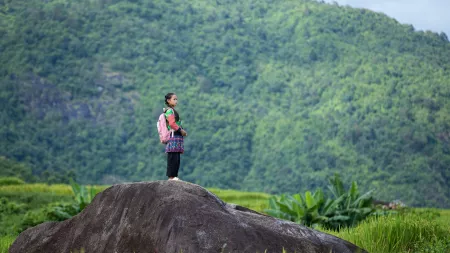Despite the commendable start with the operationalization of the Loss and Damage Fund, the first week at COP28 ended yesterday with a stall on some of the most critical issues. CARE's Climate experts comment on which decisions must be made in the second round of negotiations to halt the worsening climate chaos.
Overall lack of progress
Sven Harmeling, Global Policy Lead, CARE Climate Justice Centre, said:
“After a positive start, the lack of progress at COP28 is concerning. The operationalisation of the Loss and Damage Fund was a landmark day for climate justice but the amount of funding pledged so far can only be regarded as a very first step. Negotiators are not close to an agreement on many of the most pressing issues, from fossil fuel phase-out to a strong support package for poorer countries to address the climate crisis.
“There is an abundance of evidence to demonstrate the scale and gravity of the climate crisis. As Ministers take over after the technical negotiations, they must grasp the urgency of this moment. Their decisions will affect the lives and livelihoods of millions of people in the most marginalized communities.”
Finance
John Nordbo, Senior Climate Adviser, CARE Denmark, said:
“Despite a flurry of glossy announcements at the start of the week, the amount of new and additional climate finance commitments has been lamentable. This is catastrophic for communities facing the greatest risks from climate change, including drought, floods, and famine.
“At COP28, wealthy nations must commit to a vast increase in climate finance over the coming years. Trust between wealthy and lower-income countries is rock bottom. Promises have been broken repeatedly. As negotiations enter the second week, it is vital that concrete, binding commitments are included in the text. In addition, the barriers that prevent women’s rights organizations from accessing finance must be demolished.”
Adaptation
Obed Koringo, Climate Policy Adviser for CARE Denmark (Based in Kenya), said:
“There is a growing danger that adaptation will be overlooked and may not be given the attention it deserves at COP28. Progress on finalizing and adopting the much-awaited Global Goal on Adaptation Framework is miles off track and it is disappointing to see the back and forth in the negotiation rooms on this important agenda.
“Wealthy countries have committed to at least double adaptation finance by 2025 compared to 2019 levels. It is crucial for negotiators to make progress on adaptation finance by agreeing on a clear and robust road map setting out how the doubling will be realized. Without a plan, it will be impossible to monitor and deliver the funding required. So far, only ten countries have made quantifiable commitments of a total of just $14.3 billion to adaptation finance goals. This is far, far short of what is required.”
Loss and damage
Fanny Petitbon, Head of Advocacy for CARE France, said:
“Operationalizing the Loss and Damage Fund was a substantial milestone for climate justice. Despite significant shortcomings in the text, including the lack of a funding target and obligations for historical emitters to contribute to the Fund, this decision offers hope that those most affected by climate disasters for which they are not responsible will finally start getting reparations.
“The funding for Loss and Damage must be new and additional. While 16 countries have already made pledges at COP28 to fill the Fund, the total amount so far of $655 million looks more like breadcrumbs. It does not come close to reflecting the scale of the climate crisis. Billions of dollars are required, not millions.”
Mitigation
Mrityunjoy Das, Deputy Director, Humanitarian and Climate Action Programme for CARE Bangladesh, said:
“Above all, COP28 will be remembered for one thing - success or failure on an agreement to phase out fossil fuel. Temperatures are currently on track to rise to 2.9 degrees above pre-industrial levels this century. Only one of the three options in the latest text can prevent global warming from exceeding 1.5 degrees. There can be no delay. Dangerous distractions, including Carbon Capture and Storage (CCS), must not be allowed to derail progress. Negotiators must agree to a rapid, just, and equitable phase-out of fossil fuels.”
Gender
Rosa van Driel, Advocacy Adviser for CARE Netherlands, said:
“While COP28 has rolled out the red carpet for fossil fuel lobbyists, women and girls have been sidelined. There were just 15 women among the 133 world leaders in attendance, while there are almost twice as many men in country negotiating teams than women. As a result, it is no surprise that language on the need for gender-just climate solutions has subsequently been removed from texts.”
For any media inquiries, please contact David Moore, Media Officer at CARE International UK ([email protected])
